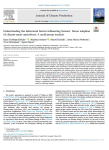Erekalo K.T., Gemtou M., Kornelis M., Pedersen S.M., Christensen T., Denver S. (2025). Understanding the behavioral factors influencing farmers' future adoption of climate-smart agriculture: a multi-group analysis. Journal of Cleaner Production, 10/06/2025, vol. 510, p. 145632.
https://doi.org/10.1016/j.jclepro.2025.145632
https://doi.org/10.1016/j.jclepro.2025.145632
| Titre : | Understanding the behavioral factors influencing farmers' future adoption of climate-smart agriculture: a multi-group analysis (2025) |
| Auteurs : | K.T. Erekalo ; M. Gemtou ; M. Kornelis ; S.M. Pedersen ; T. Christensen ; S. Denver |
| Type de document : | Article |
| Dans : | Journal of Cleaner Production (vol. 510, June 2025) |
| Article en page(s) : | p. 145632 |
| Langues : | Anglais |
| Langues du résumé : | Anglais |
| Catégories : |
Catégories principales 06 - AGRICULTURE. FORÊTS. PÊCHES ; 6.4 - Production Agricole. Système de ProductionThésaurus IAMM CHANGEMENT CLIMATIQUE ; AGRICULTURE NUMERIQUE ; COMPORTEMENT DES AGRICULTEURS ; ADOPTION DE L'INNOVATION ; MOTIVATION |
| Résumé : | The transition to climate-smart agriculture (CSA) is essential for sustainable food production, yet adoption varies widely due to differences in farmers' experiences, motivations, and constraints. Following an extended Theory of Planned Behavior (TPB) framework, this study examines the factors shaping future CSA adoption intentions among adopters and non-adopters. The findings reveal distinct adoption pathways. Positive attitudes toward CSA significantly influence adoption across all groups. Perceived behavioral control (PBC) enhances adoption intentions among non-adopters and CSA practice adopters, while social norms strongly motivate non-adopters to initiate adoption. Perceived compatibility with existing systems, values, and experiences drives the adoption of CSA practices, whereas perceived ease of use is more influential for CSA technology adoption. Additionally, economic motives primarily drive the continued adoption of CSA technologies, whereas non-economic motives encourage the continued implementation of CSA practices. Risk aversion significantly hinders CSA technology adoption. These insights underscore the importance of tailored strategies reflecting group-specific behavioral drivers. To enhance CSA adoption, peer-to-peer learning and advisory support are recommended for non-adopters, compatibility-driven awareness for practice adopters, and economic and technical support mechanisms for technology adopters. |
| Cote : | En ligne |
| URL / DOI : | https://doi.org/10.1016/j.jclepro.2025.145632 |







